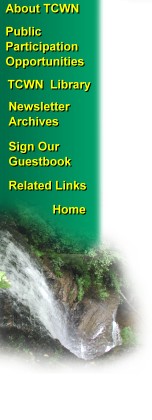


TENNESSEE
CLEAN
WATER NETWORK
Introduction
Tennessee is a water state. East Tennessee is largely characterized by
streams and rivers which cascade down the Appalachians and through the
Tennessee Valley, hosting the richest biological resources of any freshwater
system in the world. The Cumberland River drapes across our northern border
while the Tennessee River forms a smiling face across the south. The western
part of Tennessee, dotted with hundreds of wetlands, is bordered by the
mighty Mississippi. Within our state lie hundreds of streams, small rivers,
and wetlands as well as numerous man-made lakes. Tennesseans drink this
water. They swim, fish, kayak, boat, and recreate in these waters. The
economies of several towns throughout Tennessee are largely dependent
on these waters for tourism and commerce. Clean water is critical to the
economic and environmental health of our state and all of its inhabitants.
The Clean Water Act of 1972 has helped to restore and protect water across
the nation, accounting for the removal of more than one billion pounds
of toxic chemicals every day. Yet there is still much left to be accomplished.
According to the state's more recent report under section 305(b) of the
Clean Water Act, 26 percent of Tennessee's rivers and streams do not fully
support aquatic uses. According to Tennessee's toxic release inventory,
1,549,615 pounds of pollutants were released into our surface waters in
1995. EPA data from 1995-6 reveal that 25.5 percent of Tennessee's major
industrial and municipal facilities were in significant non-compliance,
and that 266 of the 96 major municipal facilities and 7 of the 42 major
industrial facilities were in significant non-compliance with their clean
water permits.
The goal of the Clean Water Act in 1972 was for all waters of the United
States to be fishable and swimmable by 1983. The Clean Water Act also
provided for elimination of all pollutants into the nation's lakes, rivers
and coastal waters by 1985. It is clear there is much left to be done.
Your willingness to participate in this conference shows that you are
committed to the challenge of working for clean water in Tennessee. Part
of the challenge will be realized in how we organize. To organize
for power, we will need to take the people at this conference and magnify
our power many times over. Part of magnifying this power will be to network
and link together for critical state issues.
Tennessee already has a number of organizations who are addressing issues
of clean water. We are blessed with a number of folks who are extremely
knowledgeable about clean water issues. Between all of our organizations,
we represent thousands and thousands of people. The problem is that we
are not talking to one another. While several clean water fights have
been successfully waged in the state of Tennessee, we have lost numerous
others. The future success of clean water issues in Tennessee is largely
dependent on our collective effort to move public opinion and influence
decision-makers.

The Proposal
The Foundation for Global Sustainability, the Clean Water Network, and
the Tennessee Environmental Council propose the formation of a network
of organizations who work on clean water issues. This is not a proposal
for a new organization or even a coalition. Instead, we propose the formation
of a tight group of committed organizations who are informed, empowered,
organized, and pulling together in the same direction.
Though this proposed network, we can coordinate efforts on important clean
water issues in the state of Tennessee. We can enlist each other's help
in our local fights. We can educate each other and provide important resources.
In many cases, we can unify as one voice and take a stand.
The central goal of this network is communication.
We need to be able to communicate rapidly and have at our fingertips the
knowledge of libraries and experts. We all need to feel that we are not
alone in the struggle for clean water. We know that communication takes
money - lots of money. We don't have lots of money. But together, if we
are committed, we can overcome the lack of big dollars commonly used to
fund and staff new organizations and coalitions.
In particular, there is one very important tool at our fingertips: the
internet. With the tools of "email" and "a webpage,"
we can communicate at the speed of light and have libraries and experts
literally at our fingertips. Most importantly, we can do it at low cost.
The proposed goals of this network are as follows:
1. To protect and improve water quality in Tennessee
2. To facilitate communication, information, and empowerment amongst Tennessee
Clean Water Network members.
3. To engage the members of the Tennessee Clean Water Network in decision-making
processes at both the state and federal levels.
4. That the network act as a technical resource for individuals and organizations
to enable them to be effective.
5. That the network will look for opportunities to educate the general
public about clean water issues in Tennessee.
Membership in the Tennessee Clean Water Network will exist at four levels.
An organization may wish to commit only to the first level of involvement
or can increase their involvement by adding new levels.
Level 1: Signing onto the general principles of the
Tennessee Clean Water Network (to be developed) and attending the annual
Clean Water conference. These principles will be broad and will model
the principles of the national Clean Water Network but will be geared
toward Tennessee.
Level 2: Join the Tennessee Clean Water list-serve
and monitor the Clean Water webpage (to be developed) for updates and
developments.
Level 3: Participate on a subcommittee which addresses
specific clean water issues such as animal factories, cumulative loading
(TMDL's) the TVA non-power program, etc. These subcommittees will communicate
primarily via email but may wish to meet or hold conference calls.
Level 4: Volunteer to serve on the state-wide steering
committee whose responsibilities will include drafting the clean water
principles, facilitating information to be distributed through the list
serve and webpage, involving new members, and planning and holding annual
conference.
The Foundation for Global Sustainability, the Clean Water Network, and
the Tennessee Environmental Council have already committed to taking the
first steps toward creating this network. We have facilitated the creation
of this conference and this proposal. All three groups are committed to
serving on the steering committee. We have identified technical resources
for developing a list serve and a web-page and should have them on-line
within the next 90 days. We will be informing interested parties on how
they can participate very soon.
To make this network a success, we need the participation of several organizations'
representatives on the steering committee. We encourage interested parties
to form subcommittees to work on specific issues, each subcommittee having
a representative on the state-wide steering committee. In addition, we
will be encouraging all Tennessee organizations to share information on
the list serve on a regular basis including issue/legislative updates,
sign-on letters, and requests for help. The success of the network is
in all of our hands. Together, we can increase our influence in Tennessee
and improve our efforts to protect and improve water quality in our state.
| Resources | Contact Us